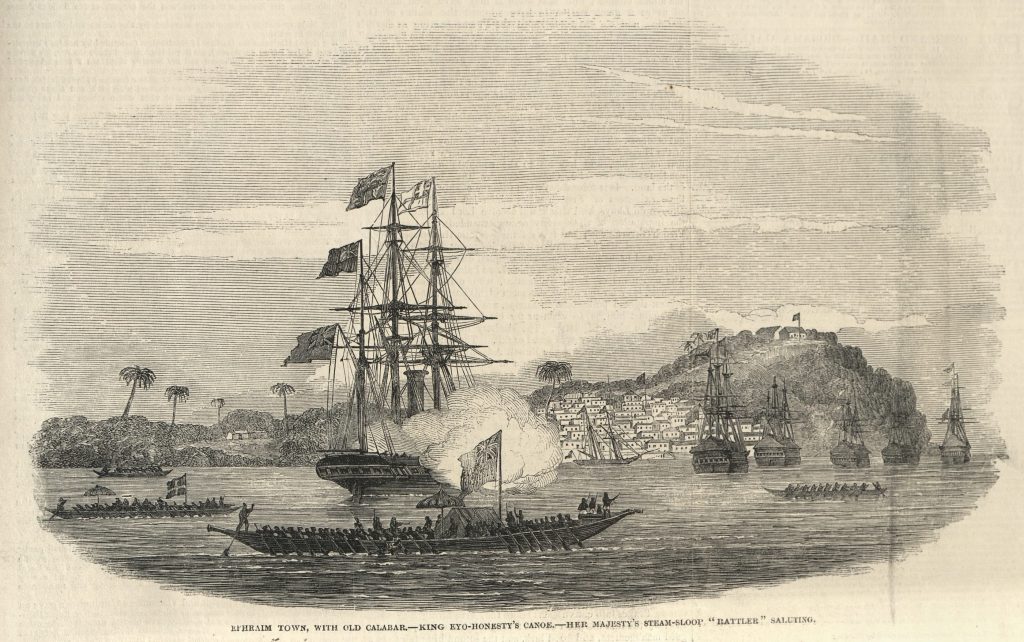The slave trade era is a part of Africa’s history that most people wish to forget.
For many Africans, the slave trade tore their families apart and saw their ancestors being treated in the most inhumane way.
Some Africans acted as middlemen for the Europeans in the trading of their fellow Africans. Eyo Honesty II is one well-known middleman and he was a great one at that.
Naturally, people would not want it to be public knowledge that their ancestors were active participants in the trade.
Today, 400 years after slavery, King Eyo Honesty II’s descendants are basking in pride over their great-great grandfather’s key role as a “big-time slave merchant” in the 1800s.
They are overly proud that he took advantage of the trade which was in season at the time to maintain and build upon their family empire. To them, a person’s character trait must shine through whatever task they perform, and they relish in being descendants of a man known for his transparency and honesty.
A man who was truthful in his dealings with the white men, making him their go-to man for business. In T.J. Hutchinson’s 1858 account, his name, Honesty, had stuck because of his honest and progressive outlook.
King Eyo Honesty, born in 1788, has a legacy that richly lies among the people of today’s Niger Delta of Nigeria. He was the King of Creek Town, one of the towns of the Efik people of Calabar.
He is hailed for many things but most prominent of them is his active role in bringing modern twists to old Efik practices and helping to cement British rule in the Niger Delta.
In a Daily Trust interview, His Royal Highness Etubom Eyo Ekpenyong Eyo Honesty II, the reigning head of the Eyo Honesty Dynasty said,
“We are the fourth generation of Eyo Honesty II. He was a great man in all meaning of the word. At that time, he had 1000 big boats as well as workers and slaves under him. With the boats, he transported his farm produce and slaves. He was a major force. One thing that was conspicuous about him was his truthfulness and kindness, which endeared him to the white men.”
“He was a trader, a dealer in palm oil. He could speak a little of the English language, which led to his becoming an interpreter between the white businessmen and the local people. This made him wealthy and famous.”
Eyo, as a child, was privileged to learn the English language which was good for trade. He also got the opportunity to travel across oceans while he served as a cabin boy under some English Captains.
He utilized his knowledge acquired understudying the Europeans and he became successful by the strength of his commercial shrewdness and self-built industry to become the wealthiest Efik before the year 1846.
Following the death of his father, Eyo Nsa, he plunged himself, first in slave trade, and after its illegality was established in his country, turned his energy to the trade in palm oil.
“Many chiefs of local communities would usually keep their slaves in the custody of Eyo Honesty for the white buyers. Available history says he would keep as many as 2000 slaves, most of them brought from distant places such as today’s Akwa Ibom, south-east states, and even Rivers State. Indigenes of Creek Town were never sold,” His Royal Highness Etubom Eyo Ekpenyong Eyo Honesty II said.
He went further to reiterate the reasons they are proud of his legacy and offered some sort of apology to the many people who do not understand their sense of pride or who were at the losing end of their former ruler’s business in the slave trade.
According to the Clan head, “Nobody should feel pained or be angry with the Eyo Honesty dynasty over the slave trade; perchance their forebears were affected. We should not be misunderstood when we say we are proud. Slave trade was a major business at that time. We are proud on one hand because apart from the pain of slave trade, he opened Creek Town, which is the root of the Efik nation and cradle of Black civilisation.
“Our great great grandfather brought Christianity into what is today called the Niger Delta region of Nigeria. He first moved for the abolishment of slave trade when he told the white people that he won’t be continuing anymore but rather asked them to bring their God to Calabar.
“He wrote to England requesting for missionaries to come to Calabar. This was how Christianity came to Africa through Calabar. But do today’s Christian leaders know this? This is why the descendants are proud.”
King Eyo Honesty II also abolished some Efik practices such as human sacrifices and the killing of twins during festivities which he referred to as “fool things” though he never converted to Christianity himself.

The Creek people, by virtue of King Eyo’s dealings with the Europeans, were the first Nigerians to be educated. Western education came to them through missionary schools which still have entrenched roots among the people of Creek Town.
The mission schools and the Presbyterian churches still have their buildings in the town, Elder Okon Eyo Nsa, a community leader and descendant of King Honesty highlighted.
The volume of trade from Africa from 1690-1807 was huge. King Eyo Honesty’s Creek Town played a pivotal role during the slave trade. In the Bight of Biafra which comprised the Old Calabar, about 76,400 slaves were taken through Creek Town, Calabar, to the new world, representing 30.1% of the entire trade.

Nearing his death, Eyo kept up with his reformative ideals and asserted that no one should be killed during his funeral when he dies as was custom to the Efik people. It is said that he died in 1858 after he had an evening meal with his brothers.










